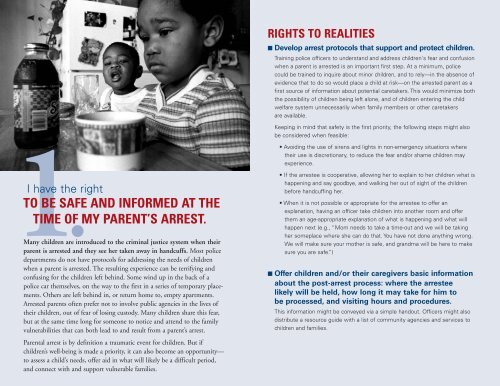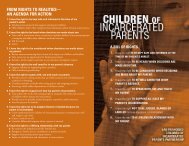Children-of-Incarcerated-Parents-Bill-of-Rights
Children-of-Incarcerated-Parents-Bill-of-Rights
Children-of-Incarcerated-Parents-Bill-of-Rights
Create successful ePaper yourself
Turn your PDF publications into a flip-book with our unique Google optimized e-Paper software.
RIGHTS TO REALITIES■ Develop arrest protocols that support and protect children.Training police <strong>of</strong>ficers to understand and address children's fear and confusionwhen a parent is arrested is an important first step. At a minimum, policecould be trained to inquire about minor children, and to rely—in the absence <strong>of</strong>evidence that to do so would place a child at risk—on the arrested parent as afirst source <strong>of</strong> information about potential caretakers. This would minimize boththe possibility <strong>of</strong> children being left alone, and <strong>of</strong> children entering the childwelfare system unnecessarily when family members or other caretakersare available.Keeping in mind that safety is the first priority, the following steps might alsobe considered when feasible:1.I have the rightTO BE SAFE AND INFORMED AT THETIME OF MY PARENT’S ARREST.Many children are introduced to the criminal justice system when theirparent is arrested and they see her taken away in handcuffs. Most policedepartments do not have protocols for addressing the needs <strong>of</strong> childrenwhen a parent is arrested. The resulting experience can be terrifying andconfusing for the children left behind. Some wind up in the back <strong>of</strong> apolice car themselves, on the way to the first in a series <strong>of</strong> temporary placements.Others are left behind in, or return home to, empty apartments.Arrested parents <strong>of</strong>ten prefer not to involve public agencies in the lives <strong>of</strong>their children, out <strong>of</strong> fear <strong>of</strong> losing custody. Many children share this fear,but at the same time long for someone to notice and attend to the familyvulnerabilities that can both lead to and result from a parent’s arrest.Parental arrest is by definition a traumatic event for children. But ifchildren’s well-being is made a priority, it can also become an opportunity—to assess a child’s needs, <strong>of</strong>fer aid in what will likely be a difficult period,and connect with and support vulnerable families.• Avoiding the use <strong>of</strong> sirens and lights in non-emergency situations wheretheir use is discretionary, to reduce the fear and/or shame children mayexperience.• If the arrestee is cooperative, allowing her to explain to her children what ishappening and say goodbye, and walking her out <strong>of</strong> sight <strong>of</strong> the childrenbefore handcuffing her.• When it is not possible or appropriate for the arrestee to <strong>of</strong>fer anexplanation, having an <strong>of</strong>ficer take children into another room and <strong>of</strong>ferthem an age-appropriate explanation <strong>of</strong> what is happening and what willhappen next (e.g., “Mom needs to take a time-out and we will be takingher someplace where she can do that. You have not done anything wrong.We will make sure your mother is safe, and grandma will be here to makesure you are safe.”)■ Offer children and/or their caregivers basic informationabout the post-arrest process: where the arresteelikely will be held, how long it may take for him tobe processed, and visiting hours and procedures.This information might be conveyed via a simple handout. Officers might alsodistribute a resource guide with a list <strong>of</strong> community agencies and services tochildren and families.



